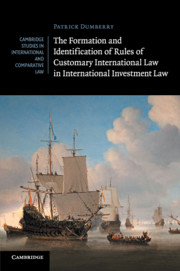Book contents
- Frontmatter
- Dedication
- Contents
- Foreword
- Preface
- Acknowledgments
- List of abbreviations
- Introduction
- 1 The concept of customary international law
- 2 Dancing with the sources: the fascinating story of the relative importance of custom and treaties at different times in the evolution of international investment law
- 3 State practice
- 4 Opinio juris
- 5 The fundamental importance of customary rules in international investment law
- General conclusion
- Bibliography
- Index
- cambridge studies in international and comparative law
2 - Dancing with the sources: the fascinating story of the relative importance of custom and treaties at different times in the evolution of international investment law
Published online by Cambridge University Press: 05 May 2016
- Frontmatter
- Dedication
- Contents
- Foreword
- Preface
- Acknowledgments
- List of abbreviations
- Introduction
- 1 The concept of customary international law
- 2 Dancing with the sources: the fascinating story of the relative importance of custom and treaties at different times in the evolution of international investment law
- 3 State practice
- 4 Opinio juris
- 5 The fundamental importance of customary rules in international investment law
- General conclusion
- Bibliography
- Index
- cambridge studies in international and comparative law
Summary
Introduction
After examining the basic features of the concept of custom in Chapter 1, the present chapter looks at the relative importance of different sources of international law in the evolution of the field of international investment law. This is a fascinating story in which the main sources relevant in this field (custom and treaties) have each played important roles in different eras. The story is best told by examining the development of two principles that are now generally considered to be rules of customary international law in investor-State arbitration.
I will first examine the origin and the development of the concept of the ‘minimum standard of treatment’ (MST) and the emergence of a general prohibition against expropriation without compensation (Section 2.1). This analysis will be followed by a look into the developments that occurred in the 1960s and 1970s, which were characterized by serious and continuing challenges to the very existence of these two rules by a large segment of States, including those which emerged from colonialism (Section 2.2). These events marked a defining moment in the history of investment law. Until then, custom had been the prevalent source of international law obligations for States. Yet, as this chapter shows, this predominance will prove to rest on fragile grounds. At different phases in the evolution of international investment law, non-Western States have rejected to be bound by any MST and contested to have to provide compensation for unlawful expropriation. As a result, the foundations of these two rules as the basic sets of legal investment protection for investors doing business abroad have been severely weakened.
It is in this context of uncertainties that Western States have increasingly adopted a bilateral approach to secure legal protection with capital-importing States on an ad hoc basis. Section 2.3 explains that by the early 1990s everything had changed. Developing States dramatically changed their historical position regarding basic legal protections for foreign investors and started to sign BITs en masse with (mostly) Western States. In light of the present-day proliferation of BITs (a phenomenon referred to as ‘treatification’), one might naturally question what remains of the historical importance of custom? In other words, while existing legal rules in the field of investment arbitration are overwhelmingly found in bilateral and multilateral investment treaties, should custom still be considered relevant today?
- Type
- Chapter
- Information
- The Formation and Identification of Rules of Customary International Law in International Investment Law , pp. 60 - 115Publisher: Cambridge University PressPrint publication year: 2016



